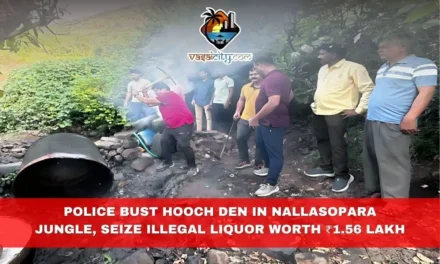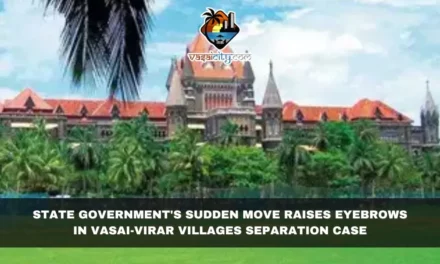Vasai: A wave of anger has erupted in Vasai against the Manikpur police, following two recent incidents that showcase alleged police brutality and misuse of power. This widespread discontent culminated in a sit-in protest led by an All-Party Struggle Committee in front of the Deputy Commissioner’s office. The protesters decried the oppressive actions of the Manikpur police, particularly highlighting the assault on a street vendor and the filing of a case against a social activist.
The first incident involved Mohammad Ansari, a key maker who worked on the sidewalk near the Manikpur police station. Ansari was brutally beaten by Police Sub-Inspector Rajshekhar Salgare for a mere 20 rupees. Despite Ansari sustaining injuries, senior police inspectors initially ignored the incident. It was only after sustained pressure from social activists that a case was finally registered against Salgare.
In a separate incident during the election period, social activist Adesh Bansode faced police action for sharing a video clip of Dhruv Rathi. The Manikpur police filed a case against Bansode for this act. These two incidents highlight what many see as the arbitrary and authoritarian behavior of the Manikpur police.
In response, the All-Party Struggle Committee organized a dharna (sit-in protest) in front of Deputy Commissioner Pournima Choughule’s office to express their outrage. The protesters accused the Manikpur police of suppressing the voices of ordinary citizens and acting in a manner that infringes upon fundamental freedoms. Various social organizations echoed these sentiments, accusing the police of supporting land mafia and builders while meting out injustice to common people.
The protest saw participation from a wide array of political parties and social groups, including the Shiv Sena (Uddhav Balasaheb Thackeray faction), Congress, Aam Aadmi Party, Me Vasai Kar, the Lawyers’ Association, the Environmental Committee, the People’s Movement Committee, the Anti-Superstition Movement, and the Socialist Party. Leaders and activists from these groups stood in solidarity, demanding justice and accountability.
Key demands from the protesters included the dismissal of Senior Police Inspector Raju Mane of Manikpur police station, the suspension of Police Sub-Inspector Rajshekhar Salgare, and the withdrawal of the case against Adesh Bansode. The demonstrators argued that these steps were necessary to restore public trust and ensure that the police act within the bounds of the law, respecting the rights and freedoms of all citizens.
The protesters voiced their concerns loudly and clearly. They accused the police of filing false cases and supporting powerful entities at the expense of ordinary people. The incidents involving Mohammad Ansari and Adesh Bansode were seen as stark examples of the police’s misuse of power, prompting widespread condemnation and calls for reform.
The beating of Mohammad Ansari over a trivial amount was particularly shocking to many. Witnesses described how Ansari, a humble key maker trying to earn an honest living, was mercilessly attacked by an officer who was supposed to uphold the law. The fact that senior officers initially ignored this incident only fueled public anger. The eventual registration of a case against Sub-Inspector Salgare came as a result of relentless pressure from social activists, who refused to let the matter be swept under the rug.
Similarly, the case against Adesh Bansode for sharing a video clip was seen as an attempt to stifle free speech. During the protest, many argued that in a democratic society, sharing information and opinions should not be a criminal act. The action against Bansode was perceived as an attempt to intimidate and silence those who dare to speak out against the authorities.
The protest at the Deputy Commissioner’s office was not just a reaction to these two incidents but a broader statement against the perceived culture of impunity within the Manikpur police. Speakers at the protest emphasized the need for systemic changes to prevent such abuses of power in the future. They called for stricter oversight of police actions and better protection of citizens’ rights.
As the protest drew to a close, the message was clear: the people of Vasai will not tolerate police misconduct. The diverse coalition of political parties and social organizations vowed to continue their fight for justice and accountability. They pledged to monitor the situation closely and to keep pressing for the necessary reforms to ensure that the police serve the community fairly and justly.
In conclusion, the protest against the Manikpur police was a significant event, highlighting deep-seated grievances about police behavior and the urgent need for change. The participation of multiple parties and organizations underscored the widespread nature of the discontent and the collective demand for a more just and accountable policing system.














